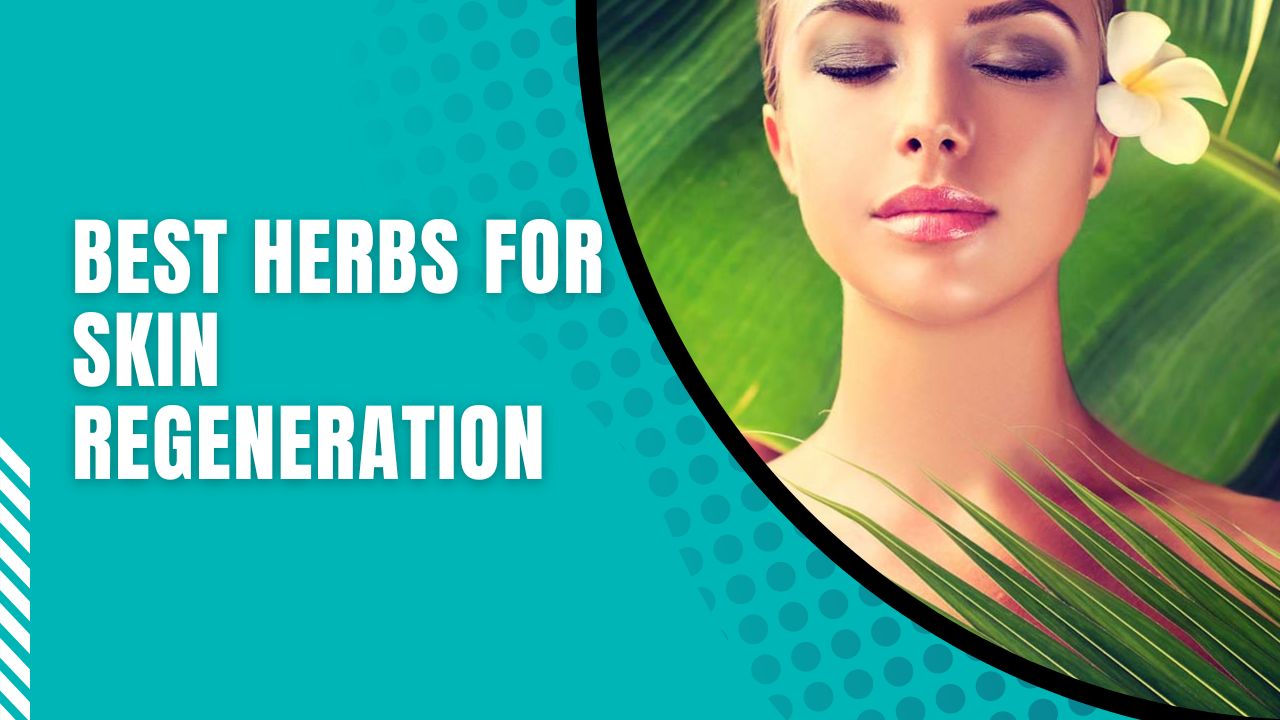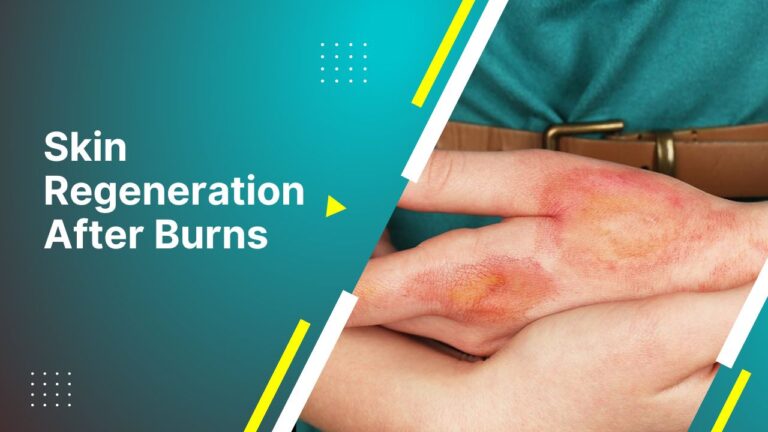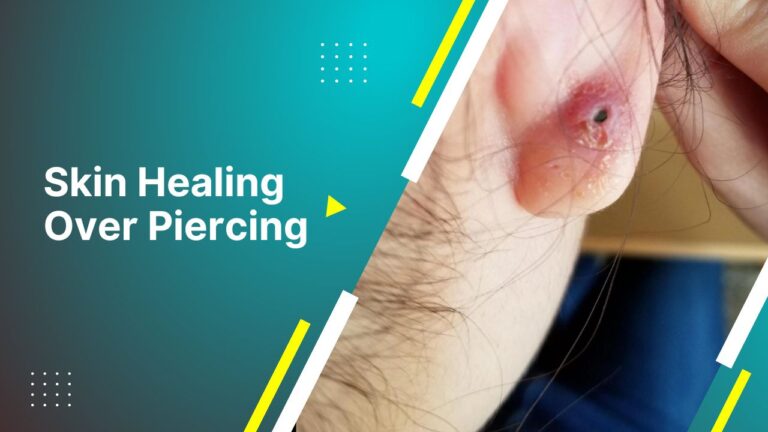Achieving flawless, youthful skin often feels like an endless battle against the effects of aging, sun damage, and other environmental stressors. While modern skincare products promise the world, many are returning to nature and exploring the most powerful herbs to encourage skin renewal.
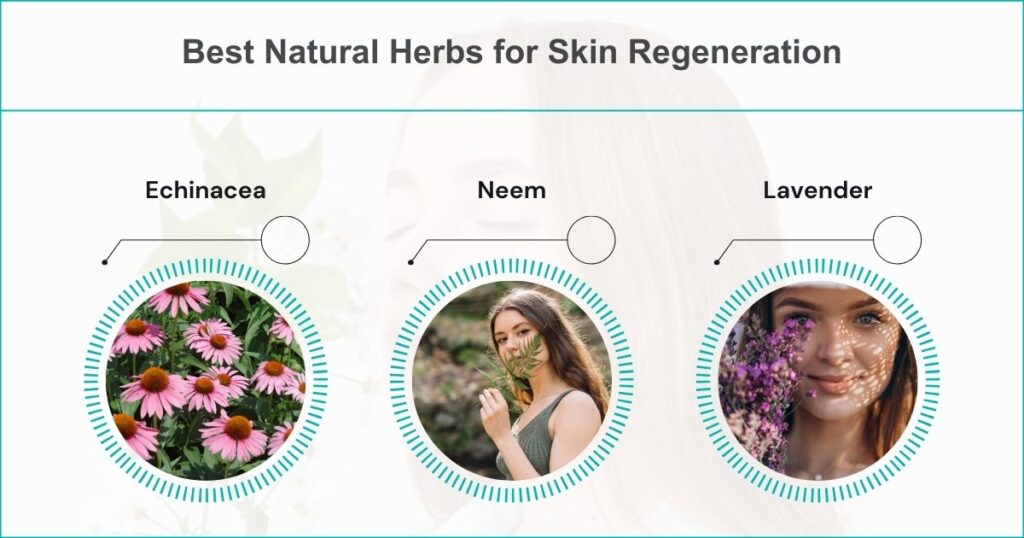
What is Skin Regeneration, and Why Do People Do It?
Skin regeneration removes the dull and scarred skin cells to reveal the underneath layer of fresh skin that is smooth, healthy, and youthful.
People do skin regeneration either for aesthetic purposes or for medical reasons. Skin regeneration solves skin ailments such as scars, sunburn, pimples, and acne.
How Do Herbs Improve Your Skin?
Certain herbs contain beneficial plant compounds that stimulate collagen production, accelerate healthy cell turnover, improve skin elasticity, and fade discoloration. Botanical favorites like aloe vera and ginseng and cutting-edge additions like gotu kola and holy basil help regenerate skin gently and effectively.
When incorporated into a regular skincare routine, the best herbs for skin regeneration can diminish fine lines and wrinkles, smooth scars and stretch marks, restore a healthy glow, and revive skin’s natural vibrancy. With the right combination of these rejuvenating herbs, achieving flawless skin for years to come may be closer than ever imagined.
Book A Consultation With Dr Tarek Bayazid
Installment Plan Available
Which herb is best for glowing skin regeneration?
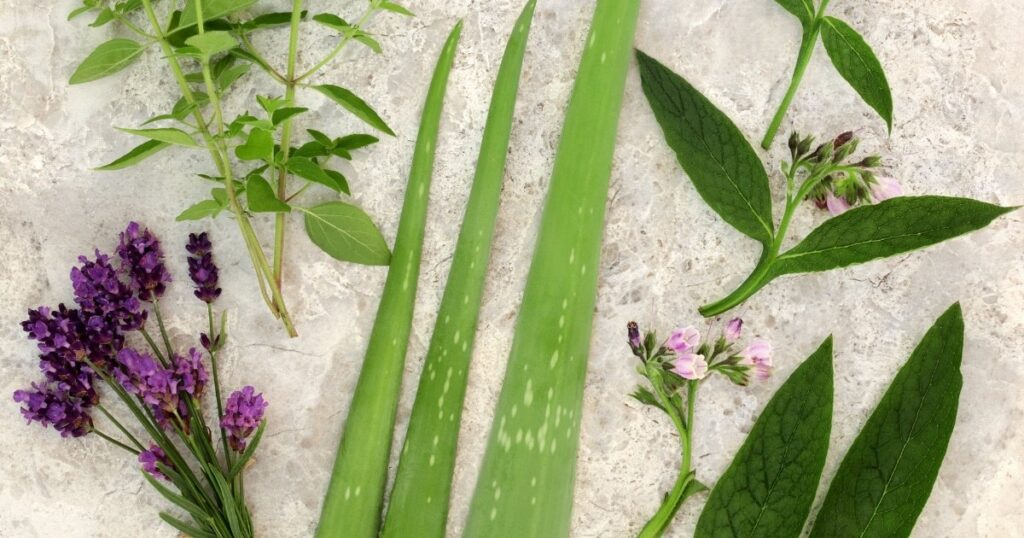
Numerous herbs have healing abilities. If you use natural extracts from chamomile, thyme or sage, their medicinal components will help you to regenerate new skin.
In the process, you will also treat the skin for conditions like sunburn, acne, and rashes. The herbs will also hydrate, moisturize and make the skin glow.
Chamomile
Chamomile, also known as the tea plant, is used to make a variety of popular beverages, including green tea, white tea, oolong tea, and black tea. The plant has two powerful antioxidants, polyphenols and phytochemicals, which benefit skin health.
Use chamomile for regular skin care. The herb has many skin benefits. The herb protects the skin from free radicals and repairs and regenerates skin cells. To make your skin restore and glow, take chamomile tea.
Thyme
Thyme has a myriad of health benefits for many parts of the body. Thyme oil stimulates blood circulation, a process that regenerates and moisturizes the skin. The healing elements in the herb rejuvenate the tired system and improve the blood flow. The procedure restores and boosts the health of the skin.
Sage
Sage is famous for its antioxidant elements, which help the body fight free radicals, tone the skin, and treat acne and oily skin issues. The sage extract has calcium and vitamin A, elements that rejuvenate the skin and restore and make the skin glow.
What Herb Hydrates for Skin Regeneration?
If you want hydrated skin, keep your face moisturized and protected from the elements. Use natural herbs to improve blood circulation. Increased blood circulation helps the skin regenerate, and you will have well-toned fresh skin with a healthy glow.
Some herbs have therapeutic properties that repair and generate new cells. Aloe vera, comfrey, and peppermint are natural herbs that hydrate the skin.
Aloe vera
Aloe vera gel is famous for its medicinal benefits for skin treatment and rejuvenation. The plant has sterols that help to produce collagen and hyaluronic acid, elements that moisturize and regenerate skin. The gel extract also treats stretch marks, wrinkles, and burns; and is a good moisturizer.
Comfrey
The extract from comfrey has allantoin, a natural moisturizer that protects the skin cells. The sap from the plant forms a film over the skin and locks in moisture, promoting rapid cell growth and soothing skin irritations. Rapid cell growth replaces the skin’s dull and dead outer layer, a process that hydrates and regenerates the skin.
Peppermint
Peppermint is one of the oldest treatment herbs with myriad benefits to the body. The herb has anti-inflammatory and antiseptic properties that cleanse and aid skin regeneration.
The menthol in the plant has a cooling effect that soothes acne, skin irritation, and inflammation. The plant contains vitamins A and C and Omega 3 fatty acids that treat oily skin. The herbal extracts are also a skin moisturizer.
Best Natural Herbs for Skin Regeneration
Skin regeneration removes the dead cells on the outer layer of the skin. The procedure also removes scarred, discolored, sunburned skin with acne to reveal the healthy and fresh layer beneath. Some of the best natural herbs for skin regeneration are echinacea, peppermint, and lavender.
Echinacea
Echinacea produces collagen, which moisturizes, hydrates, and soothes the skin. The herb has both anti-inflammatory and antimicrobial elements that treat and prevent acne. Echinacea clears acne blemishes and treats skin irritation caused by eczema and psoriasis. The herbal extracts from the plant are also good skin moisturizers.
Neem
The high levels of glycerides in the plant have antifungal, anti-inflammatory, antiseptic, and antibacterial elements that treat various skin ailments. The medicinal components in the herbal extracts prevent acne, soothe irritated skin, remove white and blackheads, and slow the aging process. Neem natural treatment and care products hydrate and regenerate the skin.
Lavender
Lavender has numerous benefits as it can tone the skin, treat acne, and remove wrinkles. The herb has soothing properties in addition to its refreshing scent. The herbal extracts have antiseptic properties that aid blood circulation, which is necessary for skin regeneration. The herb’s relaxation elements induce sleep, so it’s best to use it at night.
See related: Skin Healing Over Piercing
How to Safely Blend and Apply Herbal Solutions
Ensuring herbal solutions’ correct preparation and application is paramount to their efficacy. One must consider the herb’s concentration, purity, and source before blending it into a skincare solution. Understanding the skin’s response to different herbs can also prevent potential irritations or reactions.
- Correct Ratios– Ensure you’re using the recommended proportions of herbs to carriers to maintain effectiveness without causing skin reactions.
- Quality Over Quantity– Always opt for high-quality, organic herbs free from pesticides or chemicals.
- Patch Test- Before completing the application, always conduct a patch test to check for allergic reactions or sensitivities.
- Preservation– Consider natural preservatives to enhance the shelf-life of your DIY herbal solutions.
- Application Technique– Gentle, circular motions are recommended to enhance absorption and stimulate circulation.
- Storage- Store your herbal solutions in a cool, dark place to maintain their potency.
- Consultation- Always consult a dermatologist or herbal expert before introducing a new herb into your skincare routine.
The Science Behind Herbal Skin Restoration
Herbs have been celebrated for their medicinal properties for centuries, and modern science confirms their benefits in skincare. Active compounds in certain herbs can promote collagen synthesis, combat free radicals, and provide anti-inflammatory effects. Such mechanisms pave the way for skin regeneration, helping maintain a youthful and radiant complexion.
- Collagen Synthesis- Herbs like gotu kola promote collagen synthesis, which is crucial for skin elasticity.
- Antioxidant Properties– Ingredients like green tea extract help neutralise harmful free radicals that can accelerate ageing.
- Anti-Inflammatory Actions– Turmeric and chamomile, among others, offer natural anti-inflammatory properties that soothe and calm the skin.
- Natural Moisturisation– Many herbs help retain moisture, essential for skin hydration and suppleness.
- Barrier Strengthening– Certain herbs can fortify the skin’s natural barrier, protecting against environmental stressors.
- Cell Turnover– Herbs like rosemary stimulate cell turnover, promoting a fresher, rejuvenated complexion.
- Research & Development– Constant scientific exploration is uncovering new herbal benefits for skincare, ensuring they remain at the forefront of natural beauty solutions.
Customising Your Herbal Skincare Regimen
A one-size-fits-all approach rarely works in skincare, which is valid for herbal solutions. Recognising individual skin types, concerns, and goals is crucial for creating an effective herbal regimen. With myriad herbs available, one can tailor solutions to address specific needs, from hydration to anti-ageing.
| Customisation Aspect | Guidance | Example |
| Skin Type | Identify your skin’s nature | Oily, Dry, Sensitive |
| Skin Concern | Target specific problems | Acne, Dryness, Ageing |
| Seasonal Needs | Adjust regimen as seasons change | More moisture in winter |
| Combining Herbs | Use synergistic effects | Turmeric + Black Pepper |
| Routine Introduction | Start slowly, observe reactions | Introduce one herb at a time |
| Simplicity | Avoid overcomplicated routines | 3-4 core products |
The table emphasises the importance of personalisation in skincare, offering guidance on various aspects when customising an herbal skincare regimen.
Herbal Teas for Healthy Skin
Herbal Teas for Healthy Skin. Certain herbal tea blends can promote skin health and regeneration from the inside out. The antioxidants and anti-inflammatory compounds in green tea, chamomile, and ginger can provide complementary benefits when consumed regularly.
Conclusion
Skin is the body’s largest organ, making it vulnerable due to exposure to the elements. As a result, it requires routine care to regenerate a fresh layer. Use the herbs described above for medicinal and cosmetic treatment. You will enjoy a well-toned, glowing, and rejuvenated skin.
Would you like to consult a professional cosmetic surgeon? Would you like to know more about the best herbs for skin regeneration? Dr. Tarek is the best in the field. He has over 15 years of experience in facial rejuvenation and body contouring. Visit Dr. Tarek Aesthetics Clinic in Dubai for all your aesthetic needs. You will be in good hands.
The reputable surgeon is a member of:
